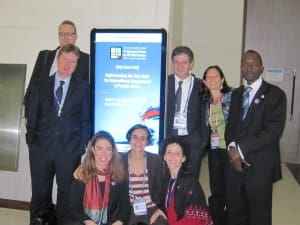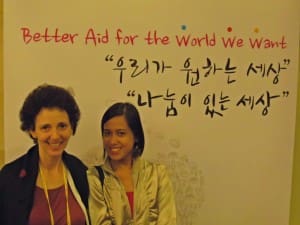I wrote this article, “Do I sound impatient? Busan +1 from Palestine” for one of the best development sites around, How Matters. It is part of an Oxfam-sponsored feature on DevEx called, “One year later, where do we stand on commitments made in Busan?“
* * * * *
What exhilaration I felt as a delegate to the Fourth High Level Forum on Aid Effectiveness (HLF4)! I represented a Palestinian NGO with a long commitment to activism for aid reform. For years we did research, made films, circulated petitions, and finally, we were at the table with the decision-makers. I felt bolstered by a decade of global commitments to aid reform and inspired by the brilliance of the advocates coming from conflict and fragile situations. I hoped that the New Deal for Engagement in Fragile States would pave the way for a new type of aid that respects legitimate politics, people’s security, access to justice, improved livelihoods, and accountable and fair service delivery. After all, all the major donors to Palestine, including the United States and European Union, immediately endorsed the New Deal.
But now, one year later, I sit in Jerusalem contemplating the white tails of rockets, trying to understand the logic: yet another unconscionable Israeli attack on Gaza using bombs paid for by the U.S. Yet when the bombs stop and the burials are complete, the U.S. (and others) will pay for the reconstruction. Is that a good use of aid?

What is the purpose of “aid” if the major donors to Palestine fail to ensure protection for those they claim to seek to help? What is the purpose of “aid” if the major donors to Palestine continue to support Israel politically and economically despite its continued lack of compliance with international humanitarian law?
Do I sound impatient? I am. We don’t have time for consultations on policy coherence. We need donor governments to implement their own policies, fulfill their commitments, and act with integrity. Now. Integrity doesn’t need a logframe.
Do I sound angry? I am. I feel duped. I was part of the aid reform movement before realizing that both aid and aid reform are industries that profit some at the expense of others. Both aid and aid reform distract us from real social change, allowing the powers-that-be to get on with their business of saying one thing and doing another.
In October, I wrote an article in the Guardian outlining my disappointment with aid and aid reform entitled, “Should Palestinians Boycott International Aid?” It does not advocate a blanket rejection of aid, but calls for Palestinians to proactively articulate criteria for acceptable aid and when and why it should be rejected. If Palestinians and other aid-dependent peoples become the gatekeepers for aid funds allocated on their behalf, it will achieve a subtle but profound shift in the balance of power. And this will influence global aid policy much faster and more sustainably than high level forums.
Am I disappointed by the outcome of Fourth High Level Forum on Aid Effectiveness? Hell yeah. Aren’t you?

Nora,
The juxtaposition of “aid” and “war” seems more like a game if smoke and mirrors…facilitated by political posturing and political correctness in media speak. I think you raise some interesting points in the real issues outlined in your 12/1/12 article: What does it mean to be an ally when they are killing others? Why should aid fund death, destruction and war? Good call! I am interested in learning about the other responses you will receive to the above mentioned article.
Me too.